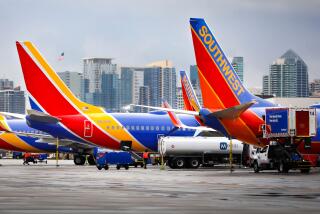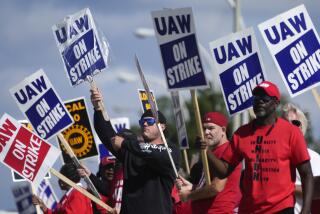Workers to Reap Bonanza From Western Stock : Employees Took Wage Cuts to Help Troubled Airline
- Share via
NEW YORK — It is going to be a prosperous holiday season for 9,300 employees of Western Airlines. Any day now, they’ll be getting their shares of $75.8 million for the stock they own in the carrier, which is in the process of being bought for $860 million by Delta Air Lines.
In effect, it’s their reward for twice helping to bail Western out of deep financial trouble a few years ago and keeping it afloat. At the time, the company-employee cooperation was dubbed “the partnership that saved Western.”
The $12.89-per-share payoff will average about $8,100 for each employee who participated in the Western Employee Stock Option Plan.
Workers Took Wage Cuts
To assist Western, which was deep in debt in 1983, the 10,500 employees then working for the Los Angeles-based airline dug deep, agreeing to sizable salary reductions. In exchange, Western’s workers were given one-third of the airline’s stock, a profit-sharing plan and two slots for labor representatives on Western’s 15-member board of directors, a number that was increased to four a year later. A complex formula was used to determine how much stock each employee would receive, with most weight being given to pay level.
For the 1983 wage reductions, amounting to 10% for most workers, the employee group was issued 32% of the stock, which then was trading at $4.125 per share. The pay reductions were 12.5% for management and 18% for pilots. They were supposed to be for a one-year period.
However, a year later, the workers agreed to another reduction and to permanent changes in their labor agreements. Most then took pay cuts of 12.5%. Also, both the first and second cuts became permanent reductions. The total cost saving to the airline from the concessions was about $300 million. At the time, the workers were taking something of a gamble--one that has paid off. They had no guarantee that the stock would ever be worth anything. Nor were they assured that provisions for profit sharing and representation on the board would ever be of value.
$10 Million Paid to Employees
The profit-sharing plan called for a percentage of earnings from operations to be distributed to all employees. As a result of the company’s 1985 turnaround, a total of $10 million was paid out this year to the participants, averaging about $1,100 per employee. In 1985, Western had a record $67.1 million in profits after having reported losses totaling more than $230 million for the four previous years.
If there are profits for all 1986, workers may still have another profit-sharing payment coming before the merger is complete.
Earlier this year, Western employees were able to withdraw up to 25% of their stock holdings. Those who left the company were also allowed to withdraw all of their money. Western employees have several choices as to how to receive the money from the sale of their stock. If, for tax purposes, they want it included in 1986 income, their checks will be ready before New Year’s Eve. Or they can take their cash early in January. Or they may take the pay-out when the Delta-Western merger is consummated--expected in April--either in cash or by rolling it into the Delta savings plan.
Although the Western employees won’t get back quite as much as they contributed in wage concessions, they did manage to keep their jobs during the lean years and now appear to have a more secure future as Delta employees. In addition, Delta employees receive higher pay.
But for some Western veterans the Delta takeover will be bittersweet. Michael H. Gable, a 22-year Western employee, is sorry at the prospect of Western’s demise.
“If Western had had the money, they would have survived,” he said in a telephone interview. “But the small carriers are not going to make it in this deregulated environment. I hate to see Western leave the scene.”
Nevertheless, Gable, a sheet metal mechanic, recognizes the benefits.
“I think we lost some money (giving the concessions), but I make $14.82 an hour and I understand Delta pays the people who do my work between $18 and $19 an hour. So I think we’ll come out ahead in the long run.”
Robert Francis, a Western 727 pilot based at the airline’s Salt Lake City hub, is “absolutely thrilled” about the upcoming merger.
He said: “These two companies have similar philosophies. They are both class organizations, and that is going to go a long way in this environment.”
He received $700 from the profit-sharing plan this year, and his shares of Western’s stock will bring him about $19,000.
“I still did not make up the difference,” he says “but it was a good investment in the future of Western.”
And for Francis there is an ironic twist in the acquisition, under which he will become a Delta pilot. His father, since retired, became a pilot for the Atlanta-based airline when it acquired Northeast Airlines in 1973.
More to Read
Sign up for The Wild
We’ll help you find the best places to hike, bike and run, as well as the perfect silent spots for meditation and yoga.
You may occasionally receive promotional content from the Los Angeles Times.






